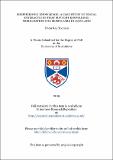Files in this item
Shepherding knowledge : a case study of social interactions that support knowledge mobilisation for sepsis care in Scotland
Item metadata
| dc.contributor.advisor | Davies, H. T. O. | |
| dc.contributor.advisor | Nutley, Sandra M. | |
| dc.contributor.author | Tooman, Tricia Ray | |
| dc.coverage.spatial | 277 p. | en_US |
| dc.date.accessioned | 2020-01-08T09:23:37Z | |
| dc.date.available | 2020-01-08T09:23:37Z | |
| dc.date.issued | 2019-12-04 | |
| dc.identifier.uri | https://hdl.handle.net/10023/19246 | |
| dc.description.abstract | This thesis is about knowledge that interconnects across different domains, and the social interactions that support the mobilisation of such knowledge for clinical practice. These issues are explored in the context of sepsis care in Scotland. Sepsis claims the lives of at least 52,000 people in the UK each year, more than breast, bowel and prostate cancer combined. While Hippocrates observed the dangers of sepsis well over two thousand years ago, only in the last 25 years has a coordinated research strategy been established to guide modern therapeutic efforts. Yet despite a mounting clinical evidence base, the cause(s), progression, treatment and even the very definition of sepsis remain often unclear and sometimes contested. In care settings, the clinical manifestations of sepsis are frequently subtle and difficult to distinguish from other common conditions, and the lack of a definitive diagnostic test heightens the range of knowledge clinicians depend upon in order to recognise and treat potentially septic patients. Within this context of uncertainty, connecting the domains of research, policy and practice remains an enduring concern in sepsis care, as with many other clinical issues. In particular, there are significant challenges in ensuring that knowledge (and knowing) in each of these domains better connect for continued improvements in patient care. This thesis then contributes to improved understanding of the persistent ‘knowing in practice’ problem: using a knowledge mobilisation framing to capture the development, sharing, and use of knowledge, where these processes are conceptualised as multifaceted and intertwined rather than segmented and detached. With a dual focus on both knowers and their knowledge, this work seeks a closer understanding of the social interactions that contribute to an interconnected ‘knowledge network’, a network that can, in turn, underpin better, safer patient care. Using a qualitative case study design, this study provides a detailed exploration of an interconnected knowledge network (on sepsis care in Scotland) that successfully drew together the research, policy, and practice communities and resulted in improved patient outcomes. Drawing on documentary, observational, and interview data, this work found that knowledge is carefully curated (through social interactions) in order to connect knowledge from the different domains and to support the mobilisation of new actionable understandings for care. Tensions within both what knowledge ‘is’, as well as the social system in which knowledge is employed, are negotiated and nurtured by social practices that have been termed ‘shepherding’. Shepherding practices are those that tend to the social interactions that support the mobilisation of knowledge, and they are in evidence throughout the distributed areas of research, policy and practice. In concluding, this thesis argues that – because knowledge is complex and emergent, and because mobilising knowledge is an ongoing social process – a developmental perspective needs to be taken as the normative frame for the ‘knowing in practice’ problem. The thesis makes two main contributions: • empirically it provides a rich and detailed account of interconnected knowledge and the social interactions that contribute to the mobilisation of that knowledge in sepsis care in Scotland; • theoretically, this work extends the academic literature that explores the diversity, complexity, and interconnectivity of knowledge for practice by emphasising the role of social interactions in supporting knowledge networks; and the study demonstrates the successful use of Soft Knowledge Systems (SKS) and Clinical Mindlines (CM) as a combined ‘relational knowledge systems’ lens to better understand knowledge mobilisation processes. | en_US |
| dc.description.sponsorship | "This work was supported by the 600th Anniversary Scholarship provided by the School of Management, University of St Andrews." -- Acknowledgements | en |
| dc.language.iso | en | en_US |
| dc.publisher | University of St Andrews | |
| dc.subject.lcc | RC182.S4T7 | |
| dc.subject.lcsh | Septicemia--Scotland--Case studies | en |
| dc.subject.lcsh | Knowledge management | en |
| dc.subject.lcsh | Social interaction | en |
| dc.subject.lcsh | Health services administration | en |
| dc.subject.lcsh | Organizational behavior | en |
| dc.title | Shepherding knowledge : a case study of social interactions that support knowledge mobilisation for sepsis care in Scotland | en_US |
| dc.type | Thesis | en_US |
| dc.contributor.sponsor | University of St Andrews. 600th Anniversary Scholarship | en_US |
| dc.type.qualificationlevel | Doctoral | en_US |
| dc.type.qualificationname | PhD Doctor of Philosophy | en_US |
| dc.publisher.institution | The University of St Andrews | en_US |
| dc.identifier.doi | https://doi.org/10.17630/10023-19246 |
This item appears in the following Collection(s)
Items in the St Andrews Research Repository are protected by copyright, with all rights reserved, unless otherwise indicated.

